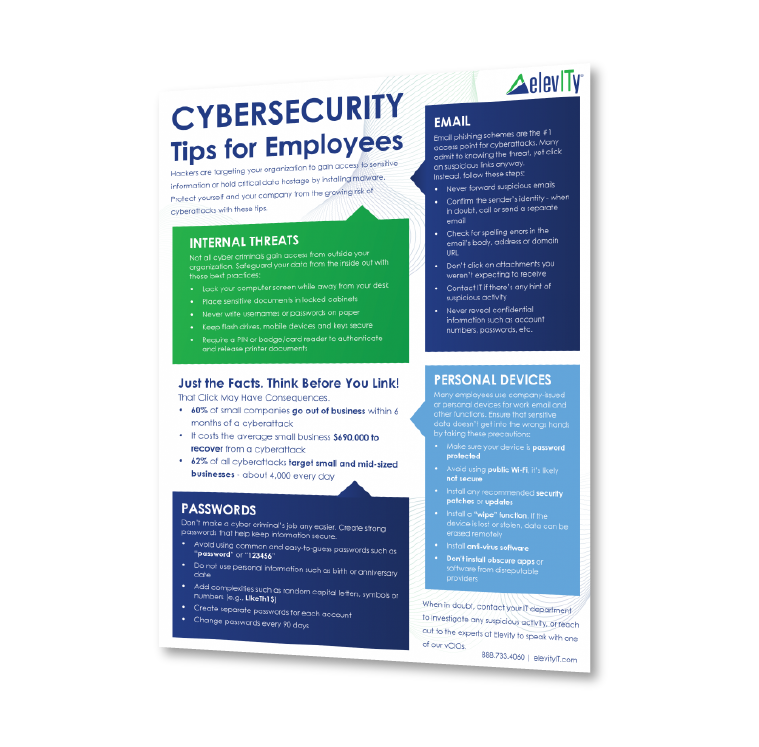If you did any work today, I can almost guarantee some of your time was spent in the cloud. That’s because 83% of enterprise workloads are now managed in the cloud.
So how do you select the right cloud provider from the thousands of options available? The answer is a selection and procurement process that is designed for your unique needs. In other words, you need to compare potential partners against your requirements, instead of comparing one against the other. When it comes to selecting a cloud provider, the requirements you have and evaluation criteria you use will be unique to your organization. However, there are some common areas of focus during any service assessment.
Here are the five top criteria we consider when looking at a potential cloud service provider:
1. Certifications and StandardsProviders should comply with recognized standards and quality frameworks demonstrate a commitment to industry best practices and standards. While standards may not determine which service provider you choose, they can be very helpful in shortlisting potential suppliers. For instance, if security is a priority, look for suppliers accredited with certifications like ISO 27001 or industry-specific security standards.
2. Do They Take Data Governance and Security Seriously?Many companies already have a data classification scheme in place that defines types of data according to sensitivity or regulations. At the very least you should be aware of regulatory or data privacy rules governing personal data.
With that in mind, the location your data resides in, and the local laws it is subject to may be a key part of the selection process. If you have specific requirements and obligations, you should look for providers that give you control regarding the jurisdiction in which your data is stored, processed and managed. Cloud service providers should be transparent about their data center locations.
Also, look to understand the provider’s data loss and breach notification processes and ensure they are aligned with your risk appetite and legal or regulatory obligations.
3. Read Their Contracts & SLAsCloud agreements can appear complex, and this isn’t helped by a lack of industry standards for how they are constructed and defined. For SLAs in particular, many jargon-happy cloud providers are still using unnecessarily complicated or even deliberately misleading language.
Ensure there are guarantees around data access, data location and jurisdiction, confidentiality and usage or ownership rights. SLAs should also specify how issues should be identified and resolved, by who and in what time. To check the cloud provider’s levels of data and system security, ask for internal security audit reports, incident reports and evidence of remedial actions for any issues raised.
4. Check Reliability & PerformanceThere are several methods you can use to measure the reliability of a service provider.
First, check the performance of the service provider against their SLAs for the last 6-12 months. Some service providers publish this information, but others should supply it if asked.
Don’t expect perfection- downtime is inevitable and every cloud provider will experience it at some point. It’s how well the provider deals with that downtime that counts. Ensure the monitoring and reporting tools on offer are sufficient and can integrate into your overall management and reporting systems.
Try to understand the provider’s disaster recovery provisions, processes and their ability to support your expectations.
5. Escape ClausesVendor lock-in is a situation where a customer using a product or service cannot easily transition to a competitor. Vendor lock-in is usually the result of proprietary technologies that are incompatible with those of competitors. However, it can also be caused by inefficient processes, or contract constraints, among other things.
Avoid the risk of vendor lock-in by ensuring your chosen provider has minimal use of proprietary technology and does not make it unnecessarily difficult to migrate to another service.
In addition to the concerns above, always take time to consider the financial health and profile of your shortlisted providers. The best and most compatible cloud service will be worthless if the provider doesn’t have a sound business. Make sure your main providers are a good fit for the long term.
Of course, these are just some of the issues to consider when looking for a cloud service provider for your business. If you would like help looking for your ideal partner, reach out the cloud service experts at Elevity. We’d be happy to help you with any cloud service research or investigations you may need.








%20cropped.jpg)





